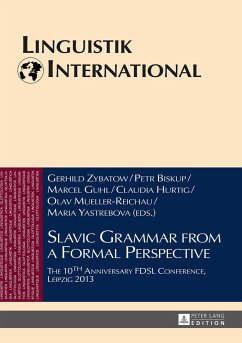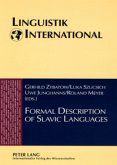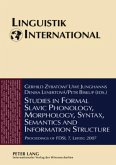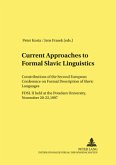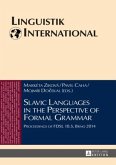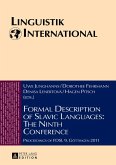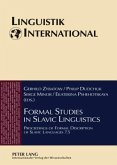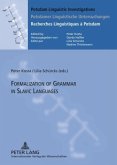Slavic Grammar from a Formal Perspective
The 10th Anniversary FDSL Conference, Leipzig 2013
Herausgegeben:Zybatow, Lew; Zybatow, Gerhild; Biskup, Petr; Guhl, Marcel; Hurtig, Claudia; Mueller-Reichau, Olav; Yastrebova, Maria
Slavic Grammar from a Formal Perspective
The 10th Anniversary FDSL Conference, Leipzig 2013
Herausgegeben:Zybatow, Lew; Zybatow, Gerhild; Biskup, Petr; Guhl, Marcel; Hurtig, Claudia; Mueller-Reichau, Olav; Yastrebova, Maria
- Gebundenes Buch
- Merkliste
- Auf die Merkliste
- Bewerten Bewerten
- Teilen
- Produkt teilen
- Produkterinnerung
- Produkterinnerung
The proceedings of the 10th European Conference on Formal Description of Slavic Languages in Leipzig 2013 offer current formal investigations into Slavic morphology, phonology, semantics, syntax and information structure. In addition to papers of the main conference, the volume presents those of two special workshops: «Formal Perspectives and Diachronic Change in Slavic Languages» and «Various Aspects of Heritage Language». The following languages are addressed: Bosnian/Croatian/Serbian (BCS), Bulgarian, Czech, Macedonian, Old Church Slavonic, Polish, Russian, Serbo-Croatian, Resian, Slovak and Slovene.…mehr
Andere Kunden interessierten sich auch für
![Formal Description of Slavic Languages Formal Description of Slavic Languages]() Formal Description of Slavic Languages130,95 €
Formal Description of Slavic Languages130,95 €![Studies in Formal Slavic Phonology, Morphology, Syntax, Semantics and Information Structure Studies in Formal Slavic Phonology, Morphology, Syntax, Semantics and Information Structure]() Studies in Formal Slavic Phonology, Morphology, Syntax, Semantics and Information Structure118,35 €
Studies in Formal Slavic Phonology, Morphology, Syntax, Semantics and Information Structure118,35 €![Current Approaches to Formal Slavic Linguistics Current Approaches to Formal Slavic Linguistics]() Current Approaches to Formal Slavic Linguistics122,50 €
Current Approaches to Formal Slavic Linguistics122,50 €![Slavic Languages in the Perspective of Formal Grammar Slavic Languages in the Perspective of Formal Grammar]() Slavic Languages in the Perspective of Formal Grammar94,05 €
Slavic Languages in the Perspective of Formal Grammar94,05 €![Formal Description of Slavic Languages: The Ninth Conference Formal Description of Slavic Languages: The Ninth Conference]() Formal Description of Slavic Languages: The Ninth Conference85,90 €
Formal Description of Slavic Languages: The Ninth Conference85,90 €![Formal Studies in Slavic Linguistics Formal Studies in Slavic Linguistics]() Formal Studies in Slavic Linguistics108,45 €
Formal Studies in Slavic Linguistics108,45 €![Formalization of Grammar in Slavic Languages Formalization of Grammar in Slavic Languages]() Formalization of Grammar in Slavic Languages91,55 €
Formalization of Grammar in Slavic Languages91,55 €-
-
-
The proceedings of the 10th European Conference on Formal Description of Slavic Languages in Leipzig 2013 offer current formal investigations into Slavic morphology, phonology, semantics, syntax and information structure. In addition to papers of the main conference, the volume presents those of two special workshops: «Formal Perspectives and Diachronic Change in Slavic Languages» and «Various Aspects of Heritage Language». The following languages are addressed: Bosnian/Croatian/Serbian (BCS), Bulgarian, Czech, Macedonian, Old Church Slavonic, Polish, Russian, Serbo-Croatian, Resian, Slovak and Slovene.
Produktdetails
- Produktdetails
- Linguistik International 35
- Verlag: Peter Lang
- Artikelnr. des Verlages: 266246
- Seitenzahl: 612
- Erscheinungstermin: 21. Oktober 2015
- Englisch
- Abmessung: 216mm x 153mm x 38mm
- Gewicht: 900g
- ISBN-13: 9783631662465
- ISBN-10: 3631662467
- Artikelnr.: 43964167
- Herstellerkennzeichnung
- Lang, Peter GmbH
- Gontardstraße 11
- 10178 Berlin
- r.boehm-korff@peterlang.com
- Linguistik International 35
- Verlag: Peter Lang
- Artikelnr. des Verlages: 266246
- Seitenzahl: 612
- Erscheinungstermin: 21. Oktober 2015
- Englisch
- Abmessung: 216mm x 153mm x 38mm
- Gewicht: 900g
- ISBN-13: 9783631662465
- ISBN-10: 3631662467
- Artikelnr.: 43964167
- Herstellerkennzeichnung
- Lang, Peter GmbH
- Gontardstraße 11
- 10178 Berlin
- r.boehm-korff@peterlang.com
Gerhild Zybatow is professor of Slavic Linguistics at the University of Leipzig. Petr Biskup is assistant professor in the Slavic Department at the University of Leipzig. Olav Mueller-Reichau and Maria Yastrebova hold research positions, Marcel Guhl and Claudia Hurtig are lecturers in the Slavic Department at the University of Leipzig.
Contents: Silje Susanne Alvestad: Event token and event type anaphora in Slavic imperatives - Julia Bacskai-Atkari: Information structure and clausal comparatives in Czech and Polish - Petr Biskup: Focused epistemic adverbs and scalar implicatures - Maria Bloch-Trojnar: The polysemy of nominals based on telic verbs in Polish - Anna Bondaruk: Subjects or objects? - The syntax of clausal subjects in Polish - Zeljko Boskovic: On prosodic boundaries - Bozena Cetnarowska: Denominal group adjectives in Polish: their morphosyntactic status and semantic interpretation - Natalia Cichosz: Polish optional datives as adjuncts - Mojmir Docekal/Hana Strachonova: Freedom to choose alternatives - Kristina Gehring: Against the SLP-status of the Russian pere-superiority - Ljudmila Geist: Genitive alternation in Russian: a situation semantics approach - Atle Grønn: On (in)definite tense and aspect in Russian - Hana Gruet-Skrabalova: Verbs and particles in minimal answers to yes-no questions in Czech - Jutta M. Hartmann/Natasa Milicevic: Pseudoclefts in Serbian - Elena Karagjosova/Katja Jasinskaja: Predicate clefts in Bulgarian - Jiri Kaspar: On pied-piping and feature percolation - Keren Khrizman/Susan Rothstein: Russian approximative inversion as a measure construction - Oksana Laleko: From privative to equipollent: incipient changes in the aspectual system of heritage Russian - Anna Malicka-Kleparska: Structure-dependent causatives in Polish - Ora Matushansky: On Russian approximative inversion - Ora Matushansky/E.G. Ruys: Measure for Measure - Krzysztof Migdalski: Diachronic changes in tense marking and cliticization patterns in Slavic - Olav Mueller-Reichau: Remarks on the non-use of perfective aspect in Russian - Olav Mueller-Reichau/Berit Gehrke: Event kind formation within the VP: Comparing Russian factual imperfectives and German adjectival passives - Joanna Pietraszko: The correlative configuration in Polish - Veronika Richtarcikova: Epistemic Indefinites in Slovak: Alternatives and Exhaustification? - Marija Runic: The Definite Article in an Articleless Language - Radek Simik: Epistemic indefinites under epistemic modals in Czech - Andrew Spencer: Bulgarian verb stems - Sergei Tatevosov: Severing imperfectivity from the verb - Marcin Wagiel: Sums, groups, genders, and Polish numerals - Melissa Witcombe: Phonology of Turkish loanwords in BCS - Maria Yastrebova: The usage of verbal aspect in the language of Russian-speaking migrants in Germany - Ksenia Zanon: On reverse hybrid wh-coordination in Russian - Slawomir Zdziebko: Opacity, variation and the exponence of Polish virile declensions - Ilse Zimmermann: The Russian subjunctive - Yulia Zinova/Hana Filip: The role of derivational history in aspect determination.
Contents: Silje Susanne Alvestad: Event token and event type anaphora in Slavic imperatives - Julia Bacskai-Atkari: Information structure and clausal comparatives in Czech and Polish - Petr Biskup: Focused epistemic adverbs and scalar implicatures - Maria Bloch-Trojnar: The polysemy of nominals based on telic verbs in Polish - Anna Bondaruk: Subjects or objects? - The syntax of clausal subjects in Polish - Zeljko Boskovic: On prosodic boundaries - Bozena Cetnarowska: Denominal group adjectives in Polish: their morphosyntactic status and semantic interpretation - Natalia Cichosz: Polish optional datives as adjuncts - Mojmir Docekal/Hana Strachonova: Freedom to choose alternatives - Kristina Gehring: Against the SLP-status of the Russian pere-superiority - Ljudmila Geist: Genitive alternation in Russian: a situation semantics approach - Atle Grønn: On (in)definite tense and aspect in Russian - Hana Gruet-Skrabalova: Verbs and particles in minimal answers to yes-no questions in Czech - Jutta M. Hartmann/Natasa Milicevic: Pseudoclefts in Serbian - Elena Karagjosova/Katja Jasinskaja: Predicate clefts in Bulgarian - Jiri Kaspar: On pied-piping and feature percolation - Keren Khrizman/Susan Rothstein: Russian approximative inversion as a measure construction - Oksana Laleko: From privative to equipollent: incipient changes in the aspectual system of heritage Russian - Anna Malicka-Kleparska: Structure-dependent causatives in Polish - Ora Matushansky: On Russian approximative inversion - Ora Matushansky/E.G. Ruys: Measure for Measure - Krzysztof Migdalski: Diachronic changes in tense marking and cliticization patterns in Slavic - Olav Mueller-Reichau: Remarks on the non-use of perfective aspect in Russian - Olav Mueller-Reichau/Berit Gehrke: Event kind formation within the VP: Comparing Russian factual imperfectives and German adjectival passives - Joanna Pietraszko: The correlative configuration in Polish - Veronika Richtarcikova: Epistemic Indefinites in Slovak: Alternatives and Exhaustification? - Marija Runic: The Definite Article in an Articleless Language - Radek Simik: Epistemic indefinites under epistemic modals in Czech - Andrew Spencer: Bulgarian verb stems - Sergei Tatevosov: Severing imperfectivity from the verb - Marcin Wagiel: Sums, groups, genders, and Polish numerals - Melissa Witcombe: Phonology of Turkish loanwords in BCS - Maria Yastrebova: The usage of verbal aspect in the language of Russian-speaking migrants in Germany - Ksenia Zanon: On reverse hybrid wh-coordination in Russian - Slawomir Zdziebko: Opacity, variation and the exponence of Polish virile declensions - Ilse Zimmermann: The Russian subjunctive - Yulia Zinova/Hana Filip: The role of derivational history in aspect determination.

